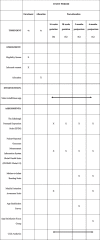Effectiveness and cost-effectiveness of an electronic mindfulness-based intervention to improve maternal mental health in the peripartum: study protocol for a randomised controlled trial
- PMID: 37996896
- PMCID: PMC10666349
- DOI: 10.1186/s13063-023-07746-7
Effectiveness and cost-effectiveness of an electronic mindfulness-based intervention to improve maternal mental health in the peripartum: study protocol for a randomised controlled trial
Abstract
Background: Perinatal women are highly vulnerable to developing mental health issues and particularly susceptible to a recurrence of psychiatric illness. Poor mental health during the perinatal period can have long-term impacts on the physical and psychiatric health of both mother and child. A potentially useful strategy to improve women's mental health is through a mobile application teaching mindfulness, an evidence-based technique helping individuals focus on the present moment.
Methods: A mixed method, prospective randomised controlled trial. The study group comprise women aged 18 years and over, who are attending the public and private maternity clinics at Mater Mothers' Hospital. A sample of 360 prenatal women will be randomised into the intervention group (with the use of the mindfulness app) or usual care. Participants will remain in the study for 11 months and will be assessed at four timepoints for changes in postnatal depression, mother-infant bonding, and quality of life. A cost-effectiveness evaluation will also be conducted using quality-adjusted life year (QALY) calculations. A random selection of intervention participants will be invited to attend focus groups to give feedback on the mindfulness app.
Discussion: Previous studies have found mindfulness interventions can reduce stress, anxiety, depression, and sleep disturbances in a prenatal population. The risks of the intervention are low, but could be of significant benefit for women who are unable to attend face-to-face appointments due to geographical, financial, or time barriers; during endemic or pandemic scenarios; or due to health or mobility issues.
Trial registration: This study was approved by the Mater Misericordiae Human Research Ethics Committee (83,589). Australian New Zealand Clinical Trials Registry (ANZCTR) ACTRN12622001581752 ( https://www.anzctr.org.au/Trial/Registration/TrialReview.aspx?id=385107&isReview=true ). Registered on 22 Dec. 2022.
Keywords: Intervention; Maternal mental health; Maternity; Mindfulness; Peripartum.
© 2023. The Author(s).
Conflict of interest statement
The authors declare that they have no competing interests.
Figures
Similar articles
-
Effectiveness and cost-effectiveness of an electronic mindfulness-based intervention (eMBI) on maternal mental health during pregnancy: the mindmom study protocol for a randomized controlled clinical trial.Trials. 2020 Nov 17;21(1):933. doi: 10.1186/s13063-020-04873-3. Trials. 2020. PMID: 33203471 Free PMC article.
-
Perinatal Women's Perspectives of, and Engagement in, Digital Emotional Well-Being Training: Mixed Methods Study.J Med Internet Res. 2023 Oct 17;25:e46852. doi: 10.2196/46852. J Med Internet Res. 2023. PMID: 37847537 Free PMC article.
-
Efficacy and cost-effectiveness of an online mindfulness program (MindOnLine) to reduce fear of recurrence among people with cancer: study protocol for a randomised controlled trial.BMJ Open. 2022 Jan 12;12(1):e057212. doi: 10.1136/bmjopen-2021-057212. BMJ Open. 2022. PMID: 35022179 Free PMC article.
-
Care prior to and during subsequent pregnancies following stillbirth for improving outcomes.Cochrane Database Syst Rev. 2018 Dec 17;12(12):CD012203. doi: 10.1002/14651858.CD012203.pub2. Cochrane Database Syst Rev. 2018. PMID: 30556599 Free PMC article.
-
Target mechanisms of mindfulness-based programmes and practices: a scoping review.BMJ Ment Health. 2024 Aug 24;27(1):e300955. doi: 10.1136/bmjment-2023-300955. BMJ Ment Health. 2024. PMID: 39181568 Free PMC article.
References
-
- Mongan D, Lynch J, Hanna D, Shannon C, Hamilton S, Potter C, et al. Prevalence of self-reported mental disorders in pregnancy and associations with adverse neonatal outcomes: a population-based cross-sectional study. BMC Pregnancy Childb. 2019;19(1):412. doi: 10.1186/s12884-019-2572-4. - DOI - PMC - PubMed
Publication types
MeSH terms
Grants and funding
LinkOut - more resources
Full Text Sources
Medical
Research Materials


